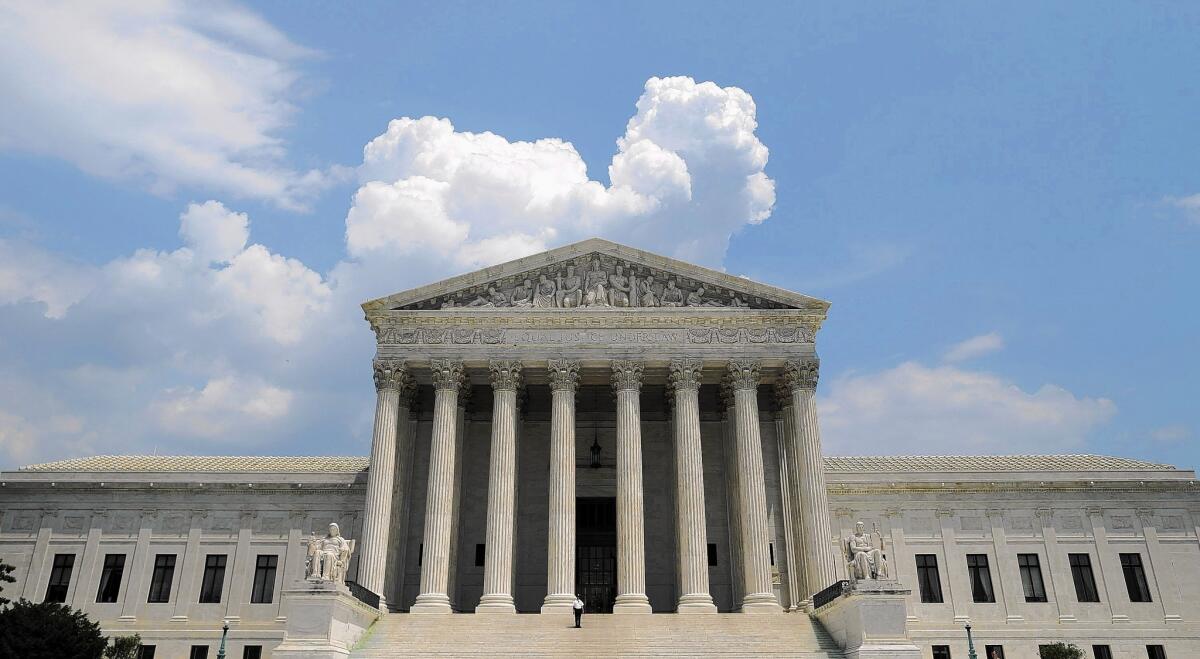States urge Supreme Court to toss out ‘seditious’ Texas lawsuit seeking to overturn Biden’s win

WASHINGTON — Pennsylvania Atty. Gen. Josh Shapiro told the Supreme Court Thursday it should not tolerate “this seditious abuse of the judicial process” and should “send a clear and unmistakable signal” so that it does not happen again.
He was responding to an unusual lawsuit filed Monday by the Texas Atty. Gen. Ken Paxton that urged the high court to overturn the election results in four states where the voters chose President-elect Joe Biden: Pennsylvania, Michigan, Wisconsin and Georgia.
“Nothing in the text, history, or structure of the Constitution supports Texas’ view that it can dictate the manner in which four other states run their elections,” he said. Top lawyers for the other three states agreed, telling the high court there was no legal basis for reconsidering their results.
However, the long-shot lawsuit gives the Supreme Court one last chance to weigh in on the 2020 election.
President Trump predicted the high court would end up deciding the election, and he voiced confidence that his three appointees — Justices Neil M. Gorsuch, Brett M. Kavanaugh and Amy Coney Barrett — would swing the outcome in his direction.
But Trump lost the election by more than 7 million votes, and his campaign’s bid to challenge the outcome lost repeatedly in all the key states. Most of the claims of flaws or fraud were so weak they were not sent to the Supreme Court. Earlier this week, the justices without comment refused to consider one appeal from several Pennsylvania Republicans.
On Wednesday, Trump told the court he wanted to join the Texas lawsuit. His brief was filed by John Eastman, a law professor at Chapman University in Orange. Eastman set off a controversy in August by making the false claim that Kamala Harris, who was born in Oakland, may not qualify as a “natural born” citizen eligible to be president because her parents were immigrants.
Having lost the votes and his legal claims in the four key states, Trump asked the justices to intervene and take up the issue for the first time.
An influential group of former Republican officials filed a short brief arguing the Supreme Court has no legal basis for taking up this dispute now. “The Constitution does not make this court the multidistrict litigation panel for trials of presidential election disputes,” they wrote. The Constitution says each state will be in charge of the manner of choosing its electors for president, their filing noted.
That did not stop 18 Republican attorneys general from submitting a brief siding with Texas. They were joined Thursday by 106 Republican members of the House.
Usually, the high court rules only on appeals from lower courts. However, the Constitution gave the high court “original jurisdiction” over disputes between two states. Typically these cases involve water rights. A famous example is Arizona vs. California, the court case which since 1931 has been resolving disputes over the amount of water the two states may draw from the Colorado River.
In these cases, the court typically appoints a special master who hears evidence and issues a recommendation on what to do.
But these “original” suits involving states have never been the basis for the Supreme Court to decide broad legal questions involving how another state is running its government.
Four years ago, lawyers for Nebraska and Oklahoma tried to sue Colorado over its state law allowing the sale of marijuana. The two more conservative states objected and said they were being harmed by the marijuana crossing into their states. But without comment, the Supreme Court refused to consider their lawsuit.
Two justices — Clarence Thomas and Samuel A. Alito Jr. — regularly dissent and maintain the court has a legal duty to decide such claims.
Paxton maintained there were “unconstitutional irregularities” in how the four states dealt with their mail ballots. Like Trump, Paxton’s suit contends that sending ballots through the mail leads to fraud, but it does not cite any evidence of that.
He does, however, cite a statistical prediction that Biden had “less than one in a quadrillion” chance of winning the four states after trailing Trump early on election night.
“Expert analysis using a commonly accepted statistical test further raises serious questions as to the integrity of this election,” he wrote. “The probability of former Vice President Biden winning the popular vote in the four defendant states — Georgia, Michigan, Pennsylvania, and Wisconsin — independently given President Trump’s early lead in those states as of 3 a.m. on November 4, 2020, is less than one in a quadrillion, or 1 in 1,000,000,000,000,000.”
Several polls before the election predicted Biden would win those states. Trump’s early lead in some states on election night disappeared as more votes were counted.
Democrats were far more likely to cast ballots by mail, a counting process that often took longer and in some key states did not begin until after polls closed Nov. 3. Many Republican voters went to the polls on election day, as Trump urged them to, so their votes were frequently tallied first.
More to Read
Get the L.A. Times Politics newsletter
Deeply reported insights into legislation, politics and policy from Sacramento, Washington and beyond. In your inbox three times per week.
You may occasionally receive promotional content from the Los Angeles Times.











